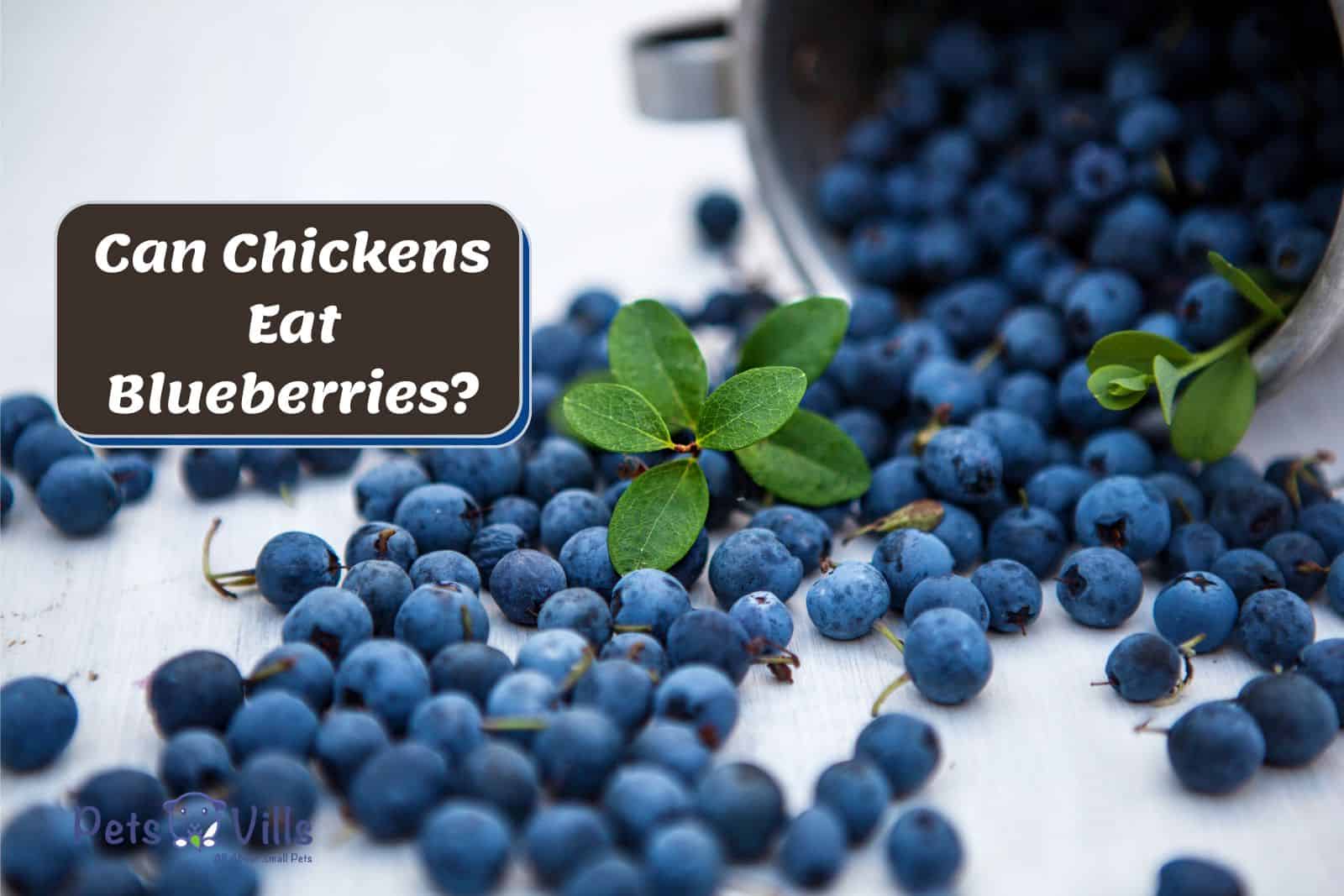Are you wondering, “Can chickens eat blueberries?”
You’d be pleased to know that chickens can eat blueberries in moderation and that blueberries make an excellent healthy treat for chickens.
But while fruits can be part of your flock’s well-balanced diets, you should keep a few things in mind to ensure your birds’ optimal health.
So, keep reading to find out more about feeding chickens blueberries.
Table of Contents
Quick Summary
- Blueberries are non-toxic fruits, suitable for chickens in moderation because of their numerous health benefits.
- Chickens can eat blueberry leaves, seeds, and frozen blueberries without adverse side effects.
- You should be careful what type of berries you feed chickens because not all berries are safe for birds.
Are Blueberries Safe to Feed to Chickens?
Can chickens eat blueberries? Yes, chickens can eat many different berries, including blueberries. Blueberries contain essential nutrients, vitamins, and minerals, making them a healthy snack.
Moreover, berries are an excellent source of antioxidants, great for keeping your backyard chickens’ immune systems strong. And berries are among chicken’s favorite treats.
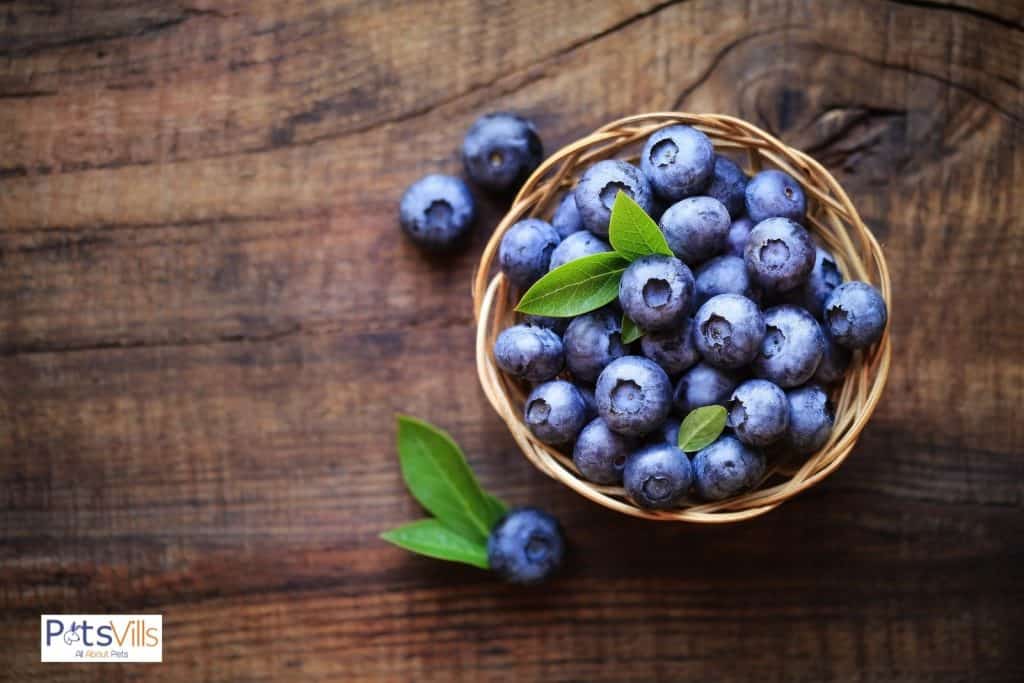
However, you must be careful when feeding blueberries to chicken. Too many treats can spoil your chicks and interfere with their egg production.
Chicken feed should be the main source of nutrition for your chickens, while treats should be no more than 10%. But what about blueberry leaves? Can you give them to your chickens? Let’s find out!
Can Chickens Eat Blueberry Leaves?
The leaves of the blueberry plant are edible, and since they don’t contain any toxic substances, they’re safe treats for chickens to eat.
When feeding blueberry leaves to the chickens, you can cut them into small pieces for easy consummation. Just make sure that the blueberry plants are pesticide and chemical-free.
Another way to feed blueberry leaves to the chicken is to dry the leaves first. I place the leaves on a tray and leave them directly in the sun for a couple of days.
After the leaves are dried, I crush them into pieces. Then I sprinkle them on their food to give the flock a boost in antioxidants and other nutrients.
However, be careful if your backyard chickens have access to your plants. Potatoes, pepper plants, and tomato plants (including the leaves) are toxic to birds.
But what about blueberry seeds? How safe are they for bird consummation?
Can Chickens Eat Blueberry Seeds?
Blueberry seeds are safe for chickens because they don’t contain trace amounts of cyanide or other dangerous chemicals (unlike apple seeds or fruit pits).
That’s a good thing because you’d have a hard time separating the seeds from the berry fruit flesh. And the seeds are beneficial because they’re rich in seed oil containing omega-3 and omega-6 acids.
According to studies, omega fatty acids can improve the quality of poultry meat and egg production. And omega acids are potent antioxidants. (1)
But what are the other health benefits of feeding blueberry chickens?
Check out this video of chickens eating blueberries:
Health Benefits of Blueberries for Chickens
The blue color of these berries comes from anthocyanin, which can protect the body from heart failure, diabetes, and inflammation.
Moreover, blueberries are an excellent source of vitamins, minerals, and antioxidants. They contain vitamin C, vitamin K, manganese, and small amounts of copper, vitamin B6, and vitamin E.
So, what are the main benefits of feeding chickens blueberries?
#1 Better Hydration
According to Healthline,100 grams of blueberries contain around 84% water, And chickens need plenty of water to stay hydrated, especially during the hot summer months. (2)
#2 Rich In Antioxidant
Blueberries are believed to have one of the highest levels of antioxidants of any fruits and vegetables, according to the National Library of Medicine. (3)
Antioxidants help protect the body from free radical damage and strengthen the immune system, resulting in healthier birds and improved egg production.
#3 Packed with Vitamins
Vitamin C is an essential nutrient for chickens. It can reduce stress, improve fertility, and increase growth. It’s also vital for a healthy heart.
Blueberries also contain vitamin K, vital for preventing blood clotting problems and keeping the eggs free from blood spots.
#4 Maintain Healthy Bones
Blueberries contain calcium, phosphorous, iron, magnesium, manganese, and zinc, essential for keeping chickens healthy.
Getting an adequate amount of these vitamins and minerals keeps the bone healthy and prevents deformities.
#5 Healthy Digestion
Blueberries are an excellent source of dietary fiber, so they can prevent constipation and help maintain regular bowel movements.
So, feeding blueberries to the chickens in moderation keeps their digestive system in great shape. But are there dangers of overfeeding blueberries to chickens? You’d be surprised!
3 Dangers of Feeding Chickens Blueberries
My chickens love blueberries and many other fresh fruits and veggies. But despite the amazing health benefits, I’m careful to provide tasty treats in moderation. You’ll see why.
1. You Can Spoil Your Chickens
Blueberries and other fruits don’t contain enough nutrients to meet the nutritional requirements of chickens. Birds need a high-quality source of protein, such as chicken feed, to thrive.
And when you spoil your flock with fresh fruits, they don’t eat enough chicken feed to stay healthy.
2. High Sugar Content
While blueberries are full of healthy nutrients, they contain sugar and can raise blood sugar levels in small animals. And too much sugar can lead to weight gain and other health problems.
3. Pesticides and Chemicals
Producers often use pesticides on blueberry bushes to get rid of pests. And some of these pesticides can be toxic to chickens, even in small amounts.
But what about frozen fruits? Can you give frozen blueberries to chickens?
Should You Feed Chickens Frozen Blueberries?
Frozen blueberries are the perfect treat for hot summer days because they can cool down your flock and provide entertainment. And they have the same nutritional content as fresh ones.
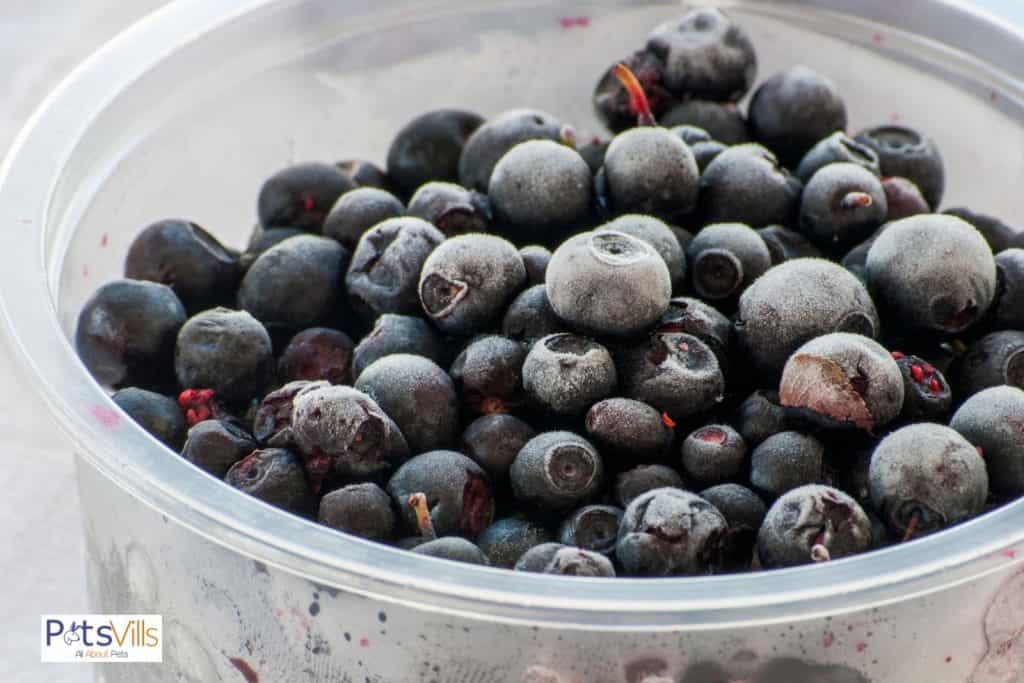
Still, be careful with frozen blueberries because they may be covered in sugar or syrup. And the extra sugar is bad for birds.
So, how do you feed blueberries to chickens to get the most health benefits? It’s easier than you think!
If you’re a chicken owner looking to incorporate some fresh produce into your chickens’ diet, check out our articles “Can Chickens Eat Raspberries?” and “Can Chickens Have Cucumber Skin?”. These informative articles are packed with valuable insights and advice on feeding your feathered friends.
Learn about the potential benefits and any precautions you should take when offering these delicious treats to your chickens. Don’t miss out on these essential resources for every chicken owner!
How To Feed Blueberries To Chickens
When it comes to feeding blueberries to chickens, it’s a straightforward process:
- Pick healthy blueberries, preferably organic and pesticide-free. Avoid moldy food.
- Give the blueberries a good wash and place them in the chicken coop or feed them by hand, as in the video below. Since blueberries are small enough, they aren’t a huge choking risk.
- If your chicks aren’t interested, you can cut the blueberries into small pieces and mix them with the feed. I recommend using a separate bowl for blueberries because they tend to stain.
- Another method is to crush the blueberries and mix them with their feeds or other fruits. Since chickens are not picky eaters, they will eat it all.
- Specialists from RSPCA also advise, “Make sure your hen food isn’t left lying around, or it might attract rodents.” (4)
But how much is too much? Let’s talk about how often you should give blueberries to chickens.
How Much And How Often To Feed Blueberries To Chickens
Blueberries don’t contain any toxins, but it doesn’t mean you can feed them to chickens as much as you want. Remember that treats shouldn’t be more than 10% of your chicken’s diet.
While blueberries are full of vitamins and minerals, they don’t have the proper nutrition to keep chickens healthy and thriving.
Therefore, it’s best to feed blueberries to the chicken in moderation, for example, a couple of times a week. Also, you’ll want to add other fruits to their diet.
When feeding blueberries to chickens for the first time, you should give a small amount first and watch for any digestive tract issues, such as diarrhea.
If there seems to be no issue and the chickens love to eat them, you can continue feeding them blueberries as an occasional treat.
2-3 blueberries per chicken are enough to reap the health benefits. Don’t feed chickens too many berries, or they’ll stop eating their staple food of commercial feeds.
And what other berries can you include in your chicken’s diet? You’ve got plenty of options.
Other Types of Berries That Chickens Can Eat
Most berries are safe for chickens and won’t cause any health problems as long as you feed them in moderation.
Blackberry
Blackberries are packed with essential nutrients and antioxidants. Great for giving chickens as a treat. These fruits are native to Europe but are a popular fruit grown year-round in the United States.
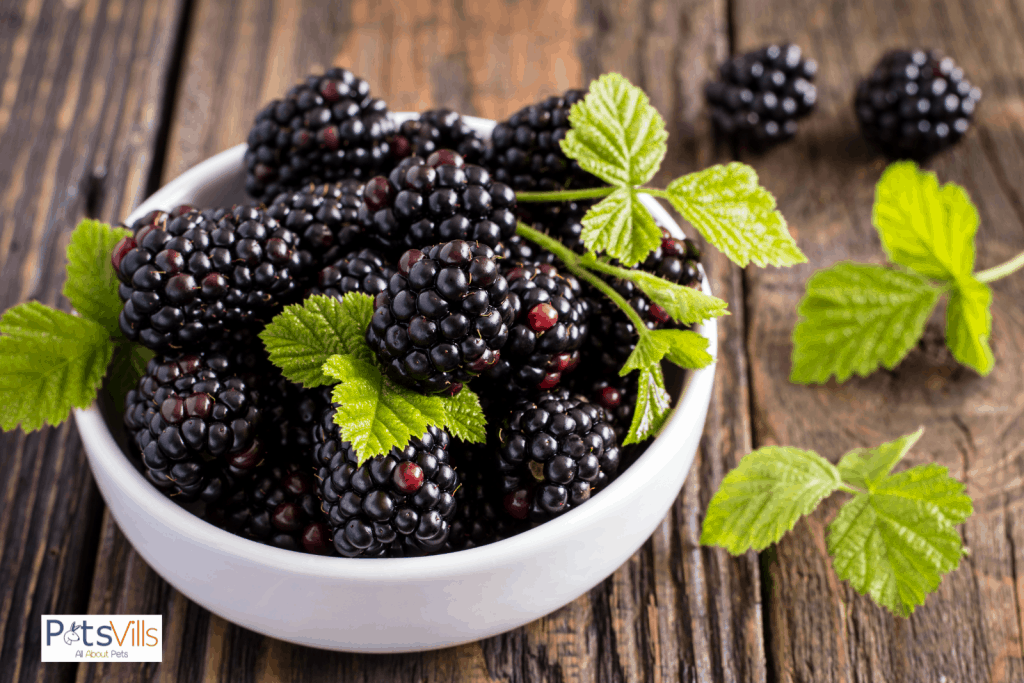
Strawberry
Strawberries are known for their bright red, juicy texture, and sweetness. You can grow these berries during the summer months or find them in grocery stores all year round.
Due to their high antioxidant content plus other essential nutrients, strawberries make an excellent treat for chickens.
Raspberry
Raspberries are high in antioxidants. They’re also packed with other vitamins and minerals as well. Due to their high nutritional value, raspberries make a great fruit to give chickens as treats.
Cranberry
Cranberries are known as a superfood due to their high nutrient and antioxidant content. These berries have a sour taste, but chickens still love them.
Berries That Are Toxic to Chickens
Avoid feeding your chickens goji berries, elderberries, and gooseberries. Always consult a vet if you’re unsure what’s toxic to your chickens.
FAQs
1. Can Chickens Eat Blueberry Muffins?

Chickens can eat blueberry muffins. However, due to the high sugar content of the muffin, they should only be fed in moderation. Too much sugar can cause weight gain and high blood sugar levels.
2. Can Chickens Eat Blueberry Pies?
Chickens can eat blueberry pies, but not too much of it. Pies are made using a lot of sugar, which could cause health issues.
3. Can You Give Chickens Fruit Every Day?
You can give a variety of fresh fruits and leafy greens to chickens daily in addition to their high-quality chicken feed. But keep the fruits up to 10% of your chicken’s daily diet.
4. How Many Blueberries Can a Chicken Eat?
Chickens can eat a lot of berries, but excess blueberries can cause digestive problems. You shouldn’t give more than 2-3 blueberries per chicken every few days.
Conclusion
Can chickens eat blueberries? You can include blueberries in your flock’s diet because berries are full of essential nutrients, antioxidants, and vitamins.
Moreover, frozen blueberries are an excellent treat for chickens during the hot summer months. Just don’t overfeed your chicks with fresh fruit, or you’ll soil them too much.
And avoid feeding baby chickens blueberries until they’re older. Baby chicks have sensitive digestive tracts and thrive on high-quality chicken feed.
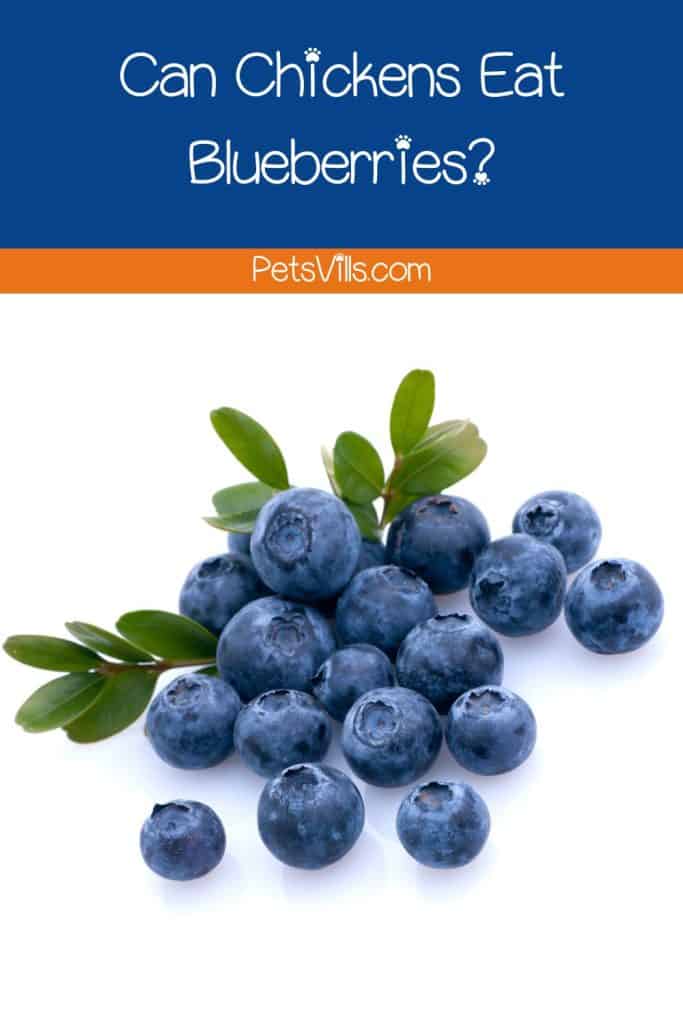
What do you think about this topic? Can chickens eat blueberries? Share your thoughts in the comment section.
Resources:
1. Alagawany M, Elnesr SS, Farag MR, Abd El-Hack ME, Khafaga AF, Taha AE, et al. Omega-3 and Omega-6 Fatty Acids in Poultry Nutrition: Effect on Production Performance and Health. Animals : an Open Access Journal from MDPI [Internet]. 2019;9. Available from: https://www.ncbi.nlm.nih.gov/pmc/articles/PMC6721126/
2. Palsdottir H. Blueberries 101: Nutrition Facts and Health Benefits [Internet]. Healthline. 2019. Available from: https://www.healthline.com/nutrition/foods/blueberries#nutrition
3. Prior RL, Cao G, Prior RL, Cao G. Analysis of botanicals and dietary supplements for antioxidant capacity: a review. Journal of AOAC International [Internet]. 2000;83:950–6. Available from: https://pubmed.ncbi.nlm.nih.gov/10995120/
4. How to Care for Chickens | Blog [Internet]. RSPCA Queensland. Available from: https://www.rspcaqld.org.au/blog/pet-care/how-to-care-for-chickens

My name is Ben Roberts, and I absolutely love animals. So, naturally, I love writing about them too! As far as my animals, I have a Pit-bull, a Beagle-lab mix, a Chihuahua, and one old cat. Each one of them provides me with a new adventure every day. And the best part is they’re all best friends. Well, except the cat when he gets a little annoyed.
FIND HIM ON: FACEBOOK and TWITTER.
Read his latest ARTICLES
Learn more about Benhere

